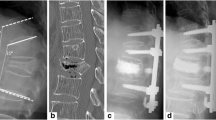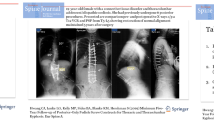Abstract
Despite the increasing number of reports on surgical treatments for thoracolumbar osteoporotic vertebral collapse with neurological deficits, the choice of surgery remains controversial. In this retrospective study, we compared the outcomes of posterior and anterior surgeries for single-level osteoporotic vertebral collapse with neurological deficit in the thoracolumbar spine. Both posterior and anterior surgical approaches were performed with a consistent procedure for a single surgical indication at one institution. Twenty-four patients treated with posterior surgery and 28 patients treated with anterior surgery were followed-up over an average of 5 years after surgery. Radiographic results (kyphotic angle, bony fusion, and instrumentation failure), neurological improvement, and surgical complications were compared between the two groups. The average correction angle after surgery was larger in the posterior group than in the anterior group (P = 0.013), but not at final follow-up (P = 0.755). The average loss of correction was also higher in the posterior group than in the anterior group (P = 0.037). There was no significant difference in neurological outcomes between anterior and posterior approaches (P = 0.080). Two-way analysis of variance (ANOVA) showed that the neurological outcome was better in wedge type than in flat type vertebral collapse, regardless of the type of surgical approach (P = 0.0093). In wedge type vertebral collapse, neurological improvement tended to be greater after anterior than after posterior surgery. In four of six cases with instrumentation failure in the anterior group, a titanium cage subsided more than 5 mm but bony fusion was eventually achieved without causing neurological problems. In the posterior group, six cases experienced instrumentation failure during the postoperative course (two cases with screws loosened from pedicles and bodies, and one case with breakage of a screw neck). None of the patients developed instrumentation-related neurological problems. Two cases in each group developed pseudoarthrosis. In single-level osteoporotic vertebral collapse with neurological deficit, anterior surgery tended to improve neurological deficit in wedge type, but not in flat type collapse, compared with posterior surgery.



Similar content being viewed by others
References
Abitbol JJ, Marshall L, Chesnut RM (1993) Posterolateral spinal canal decompression for traumatic injuries. In: Garfin SR, Northrup BE (eds) Surgery for spinal cord injuries. Raven Press NewYork pp 239–244
Arciero RA, Leung KYK, Pierce JH (1995) Spontaneous unstable burst fracture of the thoracolumbar spine in osteoporosis. Spine 14:114–117
Baba H, Maezawa Y, Kamitani K, Furusawa N, Imura S, Tomita K (1995) Osteoporotic vertebral collapse with late neurological complications. Paraplegia 33:281–289
Chiba M, McLain RF, Yerby SA, Moseley TA, Smith TS, Benson DR (1997) Short-segment pedicle instrumentation: biomechanical analysis of supplemental hook fixation. Spine 21:288–294
Cho LM, Knight RQ (1997) Idiopathic avascular necrosis of a vertebral body. Case report and literature review. Spine 22:1928–1932
Coe JD, Warden KE, Engr MB, Herzig MA, McAfee PC (1990) Influence of bone mineral density on the fixation of thoracolumbar implants. A comparative study of transpedicular screws, laminar hooks, and spinous process wires. Spine 15:902–907
Denis F (1983) The three column spine and its significance in the classification of the acute thoracolumbar spinal injuries. Spine 8:817–832
Frost HM (1981) Clinical management of the symptomatic osteoporotic patient. Othop Clin N Am 12:671–681
Fujiwara A, Kobayashi N, Saiki K, Kitagawa T, Tamai K, Saotome K (2003) Association of the Japanese orthopaedic association score with the Oswestry Disability Index, Roland-Morris Disability Questionnaire, and short-form 36. Spine 28:1601–1607
Garfin SR, Mowery CA, Guerra J Jr, Marshall LF (1985) Confirmation of the posterolateral technique to decompress and fuse thoracolumbar spine burst fractures. Spine 10:218–223
Hadjipavlou AG, Katonis PG, Tzermiadianos MN, Tsoukas GM, Sapkas G (2003) Principles of management of osteometabolic disorders affecting the aging spine. Eur Spine J 12:113–131
Halvorson TL, Kelley LA, Thomas KA, Whitecloud TS III, Cook SD (1994) Effects of bone mineral density on pedicle screw fixation. Spine 19:2415–2420
Hasegawa K, Homma T, Uchiyama S, Takahashi H (1998) Vertebral pseudarthrosis in the osteoporotic spine. Spine 23:2201–2206
Hashimoto T, Kaneda K, Abumi K, Hashimoto T, Satoh S, Fujiya M (1988) Relationship between traumatic spinal canal stenosis and neurologic deficit in thracolumbar burst fractures. Spine 13:1268–1272
Heini PF (2005) The current treatment—a survey of osteoporotic fracture treatment. Osteoporotic spine fractures: the spine surgeon’s perspective. Osteoporos Int 16:S85–92
Hu SS (1997) Internal fixation in the osteoporosis spine. Spine 22:435–85
Japanese Orthopaedic Association (1976) Criteria on the evaluation of treatment of cervical myelopathy J Jpn Orthop Assn 49: addenda no. 5
Jensen ME, Evans AJ, Mathis JM, Kallmes DF, Cloft HJ, Dion JE (1997) Percutaneous polymethylmethacrylate vertebroplasty in the treatment of osteoporotic vertebral body compression fractures: technical aspects. AJNR Am J Neuroradiol 18:1897–1904
Kaneda K, Asano S, Hashimoto T, Satoh S, Fujiya M (1992) The treatment of osteoporotic posttraumatic vertebral collapse using the Kaneda device and a bioactive ceramic vertebral prosthesis. Spine 17:295–303
Kaneda K, Taneichi H, Abumi K, Hashimoto T, Satoh S, Fujiya M (1993) Anterior decompression and stabilization with the Kaneda device for thoracolumbar burst fractures associated with neurological deficits. J Bone and Joint Surg 79-A:69–83
Kempinsky WH (1958) Osteoporosis kyphosis with paraplegia. Neurology 8:181–185
Kim KT, Suk KS, Kim JM, Lee SH (2003) Delayed vertebral collapse with neurological deficits secondary to osteoporosis. Int Orthop (SICOT) 27:65–69
Lee YL, Yip KM (1996) The osteoporosis spine. Clin Orthop 323:91–97
Lieberman I, Dudney S, Reinhardt M (2001) Initial outcome and efficacy of kyphoplasty in the treatment of painful osteoporotic vertebral compression fracture. Spine 26:1631–1638
Lotz JC, Hu SS, Chiu FM, Yu M, Colliou O, Poser RD (1997) Carbonated apatite cement augmentation of pedicle screw fixation. Spine 22:2716–2723
Maldague BE, Noel HM, Malghem JJ (1978) The intravertebral vacuum cleft: a sign of ischemic vertebral collapse. Radiology 129:23–29
McCormick PC (1993) The lateral extracavitary approach to the thoracic and lumbar spine. In: Holtzman RNN, McCormick PC, Farcy JPC (eds) Spinal instability. Springer, Berlin Heidelberg New York pp 335–347
McLain RF, Sparling E, Benson DR (1993) Early failure of short-segment pedicle instrumentation for thoracolumbar fractures. J Bone Joint Surg 75-A:162–167
Mochida J, Toh E, Chiba M, Nishimura K (2001) Treatment of osteoporotic late collapse of a vertebral body of thoracic and lumbar spine. J Spinal Disord 14:393–398
Okuyama K, Sato K, Abe E, Inaba H, Shimada Y, Murai H (1993) Stability of transpedicle screwing for the osteoporotic spine: an in vitro study of the mechanical stability. Spine 18:2240–2245
Peh WC, Gilula LA, Peck DD (2002) Percutaneous vertebroplasty for severe osteoporotic vertebral body compression fractures. Radiology 223:121–126
Saita K, Hoshino Y, Kikkawa I, Nakamura H (2000) Posterior spinal shortening for paraplegia after vertebral collapse causing by osteoporosis. Spine 25:2832–2835
Saville PD (1967) A quantitative approach to simple radiographic diagnosis of osteoporosis: its application to the osteoporosis of rheumatoid arthritis. Arthritis Rheum 10:416–422
Schnee CL, Ansell LV (1997) Selection criteria and outcome of operative approaches for thoracolumbar burst fractures with and without neurological deficit. J Neurosurg 86:48–55
Shikata J, Yamamuro T, Iida H, Shimizu K, Yoshikawa J (1990) Surgical treatment for paraplegia resulting from vertebral fractures in senile osteoporosis. Spine 15:485–489
Soshi S, Shibata R, Kondo H, Murota K (1991) An experimental study on transpedicular screw fixation in relation to osteoporosis of the lumbar spine. Spine 16:1335–1341
Suk SI, Kim JH, Lee SM, Chung ER, Lee JH (2003) Anterior-posterior surgery versus posterior closing wedge osteotomy in posttraumatic kyphosis with neurologic compromised osteoporotic fracture. Spine 28:2170–1275
Toh E, Yerby SA, Bay BK, McLain RF, Benson DR, Mochida J (2001) The effect of anterior osteophytes and flexural position of thoracic trabecular strain. Spine 26:22–26
Toribatake Y, Baba H, Kawahara N, Mizuno K, Tomita K (1997) The epiconus syndrome presenting with radicular-type neurological features. Spinal Cord 35:163–170
Wittenberg RH, Lee KS, Shea W, White AA III, Hayes WC (1993) Effect of screw diameter, insertion technique, and bone cement augmentation of pedicular screw fixation strength. Clin Orthop 296:278–287
Wright N (2005) Single-surgeon simultaneous versus staged anterior and posterior spinal reconstruction. A comparative study. J Spinal Disord Tech 18:48–57
Acknowledgement
Statistical analysis conducted in this work was supported by a grant (2003) from the Investigation Committee on Ossification of the Spinal Ligaments, the Public Health Bureau of the Japanese Ministry of Health and Welfare.
Author information
Authors and Affiliations
Corresponding author
Rights and permissions
About this article
Cite this article
Uchida, K., Kobayashi, S., Matsuzaki, M. et al. Anterior versus posterior surgery for osteoporotic vertebral collapse with neurological deficit in the thoracolumbar spine. Eur Spine J 15, 1759–1767 (2006). https://doi.org/10.1007/s00586-006-0106-z
Received:
Revised:
Accepted:
Published:
Issue Date:
DOI: https://doi.org/10.1007/s00586-006-0106-z




